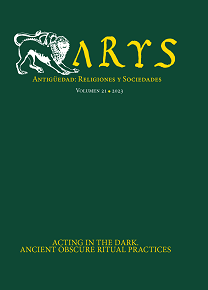La oscuridad y el oráculo de Trofonio en Lebadea
DOI:
https://doi.org/10.20318/arys.2023.7434Palabras clave:
difunto, enterramiento, Lebadea, oráculo, oscuridad, TrofonioResumen
En su Descripción de Grecia, Pausanias relata detalladamente el funcionamiento del oráculo de Trofonio, héroe responsable de la construcción de del templo de Apolo en Delfos, que se hallaba en Lebadea (Beocia). Según indica, antes de bajar al oráculo los consultantes debían realizar un complejo ritual nocturno que los preparaba para entrar en contacto con el héroe. En este capítulo se analizará el papel de la oscuridad en las distintas partes del ritual y cómo influiría en la percepción oracular de los consultantes. Se va a realizar un estudio comparativo entre los rituales de preparación de los consultantes y los rituales funerarios en Grecia. Las similitudes que se observan entre ambas ceremonias sugieren que los consultantes debían prepararse para entrar simbólicamente en el más allá y realizar la nekya con el héroe.
Descargas
Referencias
Alvar Nuño, Antón, Alvar Ezquerra, Jaime & Woolf, Greg (eds.) (2021). Sensorium. The Senses in Roman Polytheism. Leiden: Brill.
Bonnechere, Pierre (1998). La scène d’initiation des Nuées d’Aristophane et Trophonios. Nouvelles Lumières sur le culte lébadéen. Revue des études grecques, 111.2, pp. 436-480.
Bonnechere, Pierre (2003a). Trophonios de Lébadée. Cultes et mythes d’une cité béotienne au miroir de la mentalité antique. Leiden & Boston: Brill.
Bonnechere, Pierre (2003b). Trophonios of Lebadea. Mystery Aspects of an Oracular Cult in Boeotia. En Cosmopoulos, 2003, pp. 169-192.
Bonnechere, Pierre (2007). The Place of the Sacred Grove (alsos) in the Mantic Rituals of Greece. The Example of the Oracle of Trophonios at Lebadeia (Boeotia). En Conan, 2007, pp. 17-41.
Boutsikas, Efrosyni (2017). The Role of Darkness in Ancient Greek Religion and Religious Practice. En Papadopoulos & Moyes, 2017, pp. 43-63.
Brandt, J. Rasmus & Iddent, Jon W. (eds.) (2012). Greek and Roman Festivals. Content, Meaning and Practice. Oxford: Oxford University Press.
Chaniotis, Angelos (2018). Nessun Dorma. Changing Nightlife in the Hellenistic and Roman East. En Chaniotis & Pascale, 2018, pp. 1-49.
Chaniotis, Angelos & Pascale, Derron (eds.) (2018). La nuit. Imaginaire et réalités nocturnes dans le monde gréco-romain. Genéve: Fondation Hardt.
Clark, Raymond J. (1968). The Manner of His Revelation. Transactions and Proceedings of the American Philological Association, 99, pp. 63-75.
Conan, Michel (ed.) (2007). Sacred Gardens and Landscapes. Ritual and Agency. Washington DC.: Dumbarton Oaks Research Library and Collection.
Cosmopoulos, Michael B. (2003) (ed.) Greek Mysteries. The Archaeology and Ritual of Ancient Greek Secret Cults. London: Routledge.
Ekroth, Gunnel (2002). The Sacrificial Rituals of Greek Hero-Cults. Liège: Presses universitaires de Liège.
Ekroth, Gunnel (2007). Heroes and Hero-Cults. En Ogden, 2007, pp. 100-114.
Ekroth, Gunnel (2012). Pelops Joins the Party. Transformation of a Hero-Cult within the Festival at Olympia. En Brandt & Iddent, 2012, pp. 95-137.
Felton, Debbie (2007). The Dead. En Ogden, 2007, pp. 86-99.
Garland, Robert (1985). The Greek Way of Death. London: Duckworth.
Gordillo, Rocío (2021). Day and Night in the Agones of the Roman Isthmian Games. En Alvar Nuño, Alvar Ezquerra & Woolf, 2021, pp. 160-176.
Hägg, Robin (ed.) (1999). Ancient Greek Hero Cult. Proceedings of the Fifth International Seminar on Ancient Greek Cult, organized by the Department of Classical Archaeology and Ancient History (Göteborg, 21-23 April 1995). Stockholm: Svenska Institutet i Athen.
Hernández de la Fuente, David (2008). Oráculos griegos. Madrid: Alianza.
Johnston, Sarah Iles (1999). Restless Dead. Encounters between the Living and the Dead in Ancient Greece. California: University of California Press.
Jones, Chistopher (2010). New Heroes in Antiquity. From Achilles to Antinoos. Cambridge & London: Harvard University Press.
Kurtz, Donna C. & Boardman, John (1971). Greek Burial Customs. Ithaca & New York: Cornell University Press.
Martín Hernández, Raquel (2005). La muerte como experiencia mistérica. Estudio sobre la posibilidad de una experiencia de muerte ficticia en las iniciaciones griegas. Ilu. Revista de Ciencias de las Religiones, 10, pp. 85-105.
Moyes, Holley, Rigoli, Lillian, Huette, Stephanie, Montello, Daniel R., Matlock, Teenie y Spivey, Michael J. (2017). Darkness and the Imagination. The Role of Environment in the Development of Spiritual Beliefs. En Papadopoulos & Moyes, 2017, pp. 85-104.
Ogden, Daniel (2001a). The Ancient Greek Oracles of the Dead. Acta Classica, 44, pp. 167- 195.
Ogden, Daniel (2001b). Greek and Roman Necromancy. Princeton: Princeton University Press.
Ogden, Daniel (ed.) (2007). A Companion to Greek Religion. Malden, MA & Oxford: Blackwell.
Papadopoulos, Costas & Moyes, Holley (eds.) (2017). The Oxford Handbook of Light in Archaeology. Oxford: Oxford University Press.
Schachter, Albert (1981). Cults of Boiotia. Vol. 1: Acheloos to Hera. London: University of London.
Ustinova, Yulia (2009a). Cave Experiences and Ancient Greek Oracles. Time and Mind. The Journal of Archaeology, Consciousness and Culture, 2.3, pp. 265-286.
Ustinova, Yulia (2009b). Caves and the Ancient Greek Mind. Descending Underground in the Search for Ultimate Truth. Oxford: Oxford University Press.
Descargas
Publicado
Número
Sección
Licencia
Los autores conservan los derechos de autor de sus textos y todos los derechos de publicación sin restricciones.
Los documentos incluyen desde 2021 la licencia Creative Commons 4.0: Atribución–No Comercial–Sin Obra Derivada (CC BY-NC-ND 4.0). Los documentos anteriores incluyen la licencia Creative Commons 3.0: Atribución-No Comercial-Sin Obra Derivada (CC BY-NC-ND 3.0)
